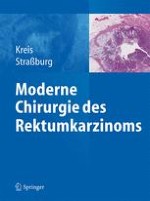Zusammenfassung
Die pathologische Untersuchung von Rektumresektaten hat in den letzten Jahrzehnten einen erheblichen Wandel durchlebt, von der rein mikroskopischen Beurteilung bis zur strukturierten Begutachtung von Makroskopie, Histologie und Molekularpathologie. Seit der Etablierung der totalen mesorektalen Resektion nach Heald und Ryall im Jahr 1986 hat die Bedeutung der histopathologischen Begutachtung von Operationspräparaten bei Rektumkarzinomen nicht nur im Hinblick auf die Qualitätsbeurteilung zugenommen. Die lokale Rezidivrate und das häufige Auftreten von postoperativen Fernmetastasen vor allem in der Leber lassen die kolorektalen Karzinome an die zweite Stelle der todesursächlichen Krebserkrankungen treten. Dabei ist nicht nur die Erfahrung des Chirurgen und die chirurgische Technik, sondern auch die pathologische Begutachtung des Operationspräparates ein wichtiger prädiktiver Faktor zur weiteren Therapie und Prognosebeurteilung.











